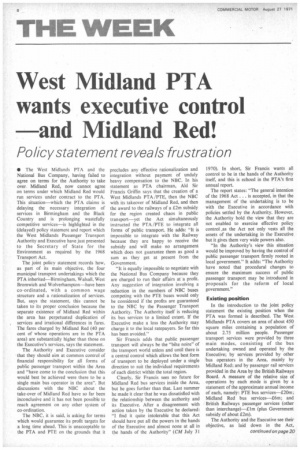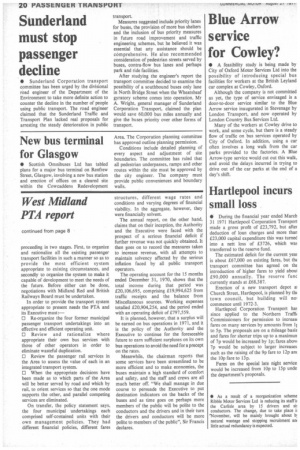West Midland PTA wants executive control • and Midland Red!
Page 10

Page 22

If you've noticed an error in this article please click here to report it so we can fix it.
Policy statement reveals frustration
• The West Midlands PTA and the National Bus Company, having failed to agree on terms for the Authority to take over. Midland Red, now cannot agree on terms under which Midland Red would run services under contract to the PTA. This situation—which the PTA claims is delaying the necessary integration of services in Birmingham and the Black Country and is prolonging wastefully competitive services—is highlighted in the (delayed) policy statement and report which the West Midlands Passenger Transport Authority and Executive have just presented to the Secretary of State for the Environment as required by the 1968 Transport Act.
The joint policy statement records how, as part of its main objective, the four municipal transport undertakings which the PTA inherited—Birmingham, Walsall, West Bromwich and Wolverhampton—have been co-ordinated, with a common wage structure and a rationalization of services. But, says the statement, this cannot be taken to its proper conclusion because the separate existence of Midland Red within the area has perpetuated duplication of services and irrational differences in fares. The fares charged by Midland Red (40 per cent of whose operations are in the PTA area) are substantially higher than those on the Executive's services, says the statement.
The Authority and Executive consider that they should aim at common control of financial responsibility for all forms of public passenger transport within the Area and "have come to the conclusion that this would best be achieved were there to be a single main bus operator in the area". But discussions with the NBC about the take-over of Midland Red have so far been inconclusive and it has not been possible to reach agreement on any other system of co-ordination.
The NBC, it is said, is asking for terms which would guarantee its profit targets for a long time ahead. This is unacceptable to the PTA and PTE on the grounds that it precludes any effective rationalization and integration without payment of unduly heavy compensation to the NBC. In his statement as PTA chairman, Aid Sir Francis Griffin says that the creation of a West Midlands PTA /PTE, then the NBC with its takeover of Midland Red, and then the award to the railways of a £2m subsidy for the region created chaos in public transport—yet the Act simultaneously instructed the PTA /PTE to integrate all forms of public transport. He adds: "It is impossible to integrate with the Railway because they are happy to receive the subsidy and will make no arrangement which does not guarantee them as good a sum as they get at present from the Government.
"It is equally impossible to negotiate with the National Bus Company because they are charged to run their affairs at 'a profit. Any suggestion of integration involving a reduction in the numbers of NBC buses competing with the PTE buses would only be considered if the profits are guaranteed to the NBC by the Passenger Transport Authority. The Authority itself is reducing its bus services to a limited extent. If the Executive make a loss the Authority may charge it to the local ratepayers. So far this has been avoided."
Sir Francis adds that public passenger transport will always be the "bête noire" of the transport world unless and until there is a central control which allows the best form of transport to be deployed under a single direction to suit the individual requirements of each district within the total region.
Clearly, Sir Francis sees no future for Midland Red bus services inside the Area, but he goes further than that. Last summer he made it clear that he was dissatisfied with the relationship between the authority and its Executive. After a disagreement with action taken by the Executive he declared: "I find it quite intolerable that this Act should have put all the powers in the hands of the Executive and almost none at all in the hands of the Authority" (CM July 31
1970). In short, Sir Francis wants all control to be in the hands of the Authority itself, and this is echoed in the PTA's first annual report.
The report states: "The general intention of the 1968 Act . .. is accepted, in that the management of the undertaking is to be with the Executive in accordance with policies settled by the Authority. However, the Authority hold the view that they are not enabled to exercise effective policy control ,as the Act not only vests all the assets of the undertaking in the Executive but it gives them very wide powers also.
"In the Authority's view this situation would be improved by having the control of public passenger transport firmly rooted in local government." It adds: "The Authority have noted that procedural changes to ensure the maximum success of public passenger transport may be introduced in proposals for the reform of local government."
Existing position In the introduction to the joint policy statement the existing position when the PTA was formed is described. The West Midlands PTA covers an area of about 450 square miles containing a population of about 2.75 million people. Passenger transport services were provided by three main modes, consisting of the bus undertaking owned and operated by the Executive; by services provided by other • bus operators in the Area, mainly by Midland Red; and by passenger rail services provided in the Area by the British Railways Board. A measure of the relative size of operations by each mode is given by a statement of the approximate annual income of each, namely: PTE bus services—£20m; Midland Red bus services—£6m; and British Railways passenger services (other than interchange)—£1m (plus Government subsidy of about f2m).
The Authority and the Executive see their objective, as laid down in the Act, continued on page 20 proceeding in two stages. First, to organize and rationalize all the existing passenger transport facilities in such a manner so as to provide the most efficient system appropriate to existing circumstances, and secondly to organize the system to make it capable of development to meet the needs of the future. Before either can be done, negotiations with Midland Red and British Railways Board must be undertaken.
In order to provide the transport system appropriate to present needs the PTA and its Executive must: O Re-organize the four former municipal passenger transport undertakings into an effective and efficient operating unit. o Review and rationalize where appropriate their own bus services with those of other operators in order to eliminate wasteful duplication.
O Review the passenger rail services in the Area to assess the value of each in an integrated transport system.
O When the appropriate decisions have been made as to which parts of the Area will be better served by road and which by rail, to orient services so that the one mode supports the other, and parallel competing services are eliminated.
On transfer, the policy statement says, the four municipal undertakings each comprised self-contained units with their own management policies. They had different financial policies, different fares structures, different wage rates and conditions and varying degrees of financial viability. In the aggregate, however, they were financially solvent.
The annual report, on the other hand, claims that on their inception, the Authority and the Executive were faced with the prospect of a serious financial deficit if further revenue was not quickly obtained. It then goes on to record the measures taken to increase revenue, with all attempts to maintain solvency affected by the serious inflation faced by all public transport operators.
The operating account for the 15 months ended December 31, 1970, shows that the total income during that period was £20,106,695, comprising £19,994,625 from traffic receipts and the balance from Miscellaneous sources. Working expenses totalled £20,904,254, and the period ended with an operating deficit of 1797,559.
It is planned, however, that a surplus will be earned on bus operations in 1971, and it is the policy of the Authority and the Executive to continue for the foreseeable future to earn sufficient surpluses on its own bus operations to avoid the need for a precept on the rates.
Meanwhile, the chairman reports that some services have been streamlined to be more efficient and to make economies, the buses maintain a high standard of comfort and safety, and the staff and crews are all much better off. "We shall manage in due course to persuade the Executive to put destination indicators on the backs of the buses and as time goes on perhaps more members of the public will be polite to the conductors and the drivers and in their turn the drivers and conductors will be more polite to members of the public", Sir Francis declares.




















































































